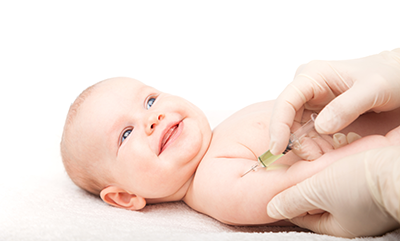Maternal Attitudes Shape Infant Vaccination Decisions.
 Maternal attitudes are the strongest predictor of whether infants will be vaccinated, with mothers who have neutral or negative attitudes about vaccines far more likely to report that their children are unvaccinated, according to a new study co-authored by School of Public Health researchers.
Maternal attitudes are the strongest predictor of whether infants will be vaccinated, with mothers who have neutral or negative attitudes about vaccines far more likely to report that their children are unvaccinated, according to a new study co-authored by School of Public Health researchers.
In the study in the Journal of Pediatrics, the research team analyzed childhood vaccine reports from more than 3,200 mothers of infants two months old to six months old and found that the vast majority of children—more than 86 percent—had received all recommended vaccines, while another 9 percent had received some vaccinations.
Compared to mothers with positive attitudes towards vaccines, mothers with “neutral and negative attitudes” had as many as 43 times the odds of reporting that their infants had received no vaccinations.
“In this nationally representative study, maternal attitudes and subjective norms toward vaccination were important predictors of infant non-vaccination, and the risk increased as maternal attitudes toward vaccination became more negative,” the authors said. They said such attitudes were more important than other kinds of barriers to access, such as scheduling or insurance problems.
Among mothers who reported that their infants had not been vaccinated, those who had less than positive attitudes about vaccination were more likely to be white, more highly educated and to exclusively breastfeed, the study said. In addition, mothers living in the Northeast and Western US were more likely to report that their infants were not fully vaccinated—a finding that the researchers said may reflect regional differences in attitudes towards vaccinations that warrants further investigation.
The authors said that further study is needed to better understand how and why mothers form their attitudes towards vaccination, and to help clinicians develop strategies for addressing vaccine hesitancy.
“Although physicians are trusted sources of advice for other infant care practices, parents who refuse vaccines may not trust the physician to provide balanced advice about vaccination,” the study said. Family, friends and media also may influence decision-making.
The study was led by Cicely Fadel of the Division of General Pediatrics and Community Health of the Children’s National Health System.
BU co-authors include: Michael Corwin, senior epidemiologist at the Slone Epidemiology Center and associate professor of pediatrics and epidemiology at SPH and the School of Medicine; Colin Wang, a research assistant at Slone; Denis Rybin, of the Data Coordinating Center; and Timothy Heeren, professor of biostatistics.